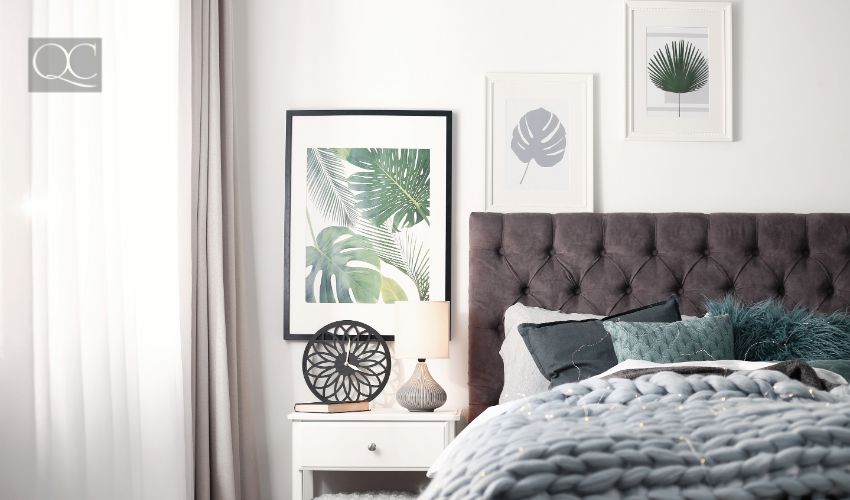If you’re reading this article, it’s probably because you dream of a successful career as an interior decorator. Furthermore, you’ve likely been thinking about enrolling in QC Design School‘s Interior Decorating Course for your professional certification training.
Sound about right? Then you’ve come to the right place!
Let’s take a look at the importance of a legitimate education, and then delve into what you can expect once you enroll in this self-paced, online program!
An interior decorator is a design expert who specializes in determining the look and feel of a client’s home. They do this by carefully selecting and then placing a wide variety of decorative elements. Such elements often include textiles, paints, colors, accessories, and furniture. As an interior decorator, some of the common tasks you’ll be responsible for include:
- Meeting with clients and conducting consultations, in order to better understand their needs and preferred design style(s).
- Creating the home design plan (i.e. floorplans, color palettes, and furniture placement).
- Shopping for furniture, window treatments, accessories, and vendors (if necessary).
- Creating a timeline of tasks and ensuring they are completed on schedule.
- Tapping into your originality and creativity when decorating for clients.
Interior Decorating Clients
The types of clients you work with can vary. For example, you might get booked by someone looking to spruce up their own living environment. Alternately, you could be hired to decorate/set up a home being placed on the market. Moreover, depending on the decorating services your business offers, you might also work with clients who wish to decorate office spaces, rather than home ones.
In this profession, your customers can range in age, gender, location, etc. However, one thing will always remain true: no two clients – and thus, no two projects – will ever be exactly the same!

Is an Interior Decorating Course Necessary?
In a word? YES!
Home design is one of those fields that requires a comprehensive understanding of industry standards and current trends. Furthermore, you must understand some of the more technical aspects of the job, too, such as developing floorplans and taking measurements. While it’s great if you have a natural eye for design, that alone won’t typically be enough for a truly thriving career. The only real (and best) way to increase your chances of success is to take a reputable interior decorating course and earn a legitimate certification!
Benefits
There are countless reasons why an internationally-recognized interior decorating certification will elevate your design career! Here are just a handful of these reasons:
- You’ll have a legit designation to add to your resume, along with a physical certification to proudly showcase to clients, vendors, and employers! For example, through QC’s Interior Decorating Course, you’ll earn an International Design and Decorating Professional (IDDP) certification and job title!
- Having a professional certification will make you that much more attractive to prospective customers! As a result, your bookings are likely to go way, way up. In turn, this will give you even more experience, beef up your portfolio, and result in a better salary!
- You’ll be confident that your skill-set is the best it can be! After all, don’t you want to impress your clientele and establish a solid reputation for your business? You’ll be able to do all this (and more) with a high-quality education under your belt!
- Your business will have a major edge over the competition! Remember: if a potential client ever has the option of an interior decorator without training, versus one with training, they will ALWAYS choose the latter. Always! Plus, if you choose to advance your qualifications with Specialty or Advanced Courses, your business can offer additional, in-demand services that others in your area do not!
- An interior decorating course can help you boost your income! Having a certification to your name is proof that you’ve invested time, money, and effort into your craft. As such, you can (and should) set your rates to reflect this. Furthermore, the more certifications you obtain, the more you can charge for ALL of your design services!

QC Design School’s Interior Decorating Course
Okay, now that you understand why a reputable interior decorating course is necessary, the question is: where should you get this training? Personally, I can think of no better program than QC Design School’s Interior Decorating Course! So, let’s take a closer look at what it is and what you’ll learn…
The Learning Environment
QC’s Interior Decorating Course is 7 units long. Because QC’s learning environment is 100% online, you have the freedom to complete your training from anywhere you want. Yes, that means even from the comfort of home while in your jammies!
Moreover, there are no deadlines or strict schedules for you to abide by. Starting from the date you first enroll, you’ll be given a full 2 years to complete your course. However, during that time, when and how much you work on your studies is completely up to you!
For reference, many of our grads found that by devoting just 1-2 hours per WEEK on their course, they were able to finish and get their certification in as little as 3-6 months.
How the Interior Decorating Course Works
Once you enroll, you’ll receive access to QC’s Online Student Center within 1-2 business days. From there, you’ll have full access to all of your digital course materials. These materials included textbooks, instructional videos, templates, and other handy resources. Additionally, QC Design School will also mail you a physical copy of your materials, along with any additional tools needed to complete the program. You should receive these physical materials in approx. 1-2 weeks after you’ve enrolled.
Once enrolled, you will also be paired with one of QC’s industry-leading tutors. All tutors are real-life designers with years of in-field experience! Once you begin your course, your quizzes are to be completed within your Online Student Center profile. Likewise, assignments will be downloaded, filled out, uploaded, and submitted as either PDF or Word document files. Some of your assignments will be scenario-based, whereas others will require hands-on work.
After you’ve submitted each unit, you’ll need to wait until you’ve been graded before moving onto the next section of your course. Your tutor will take the time to review all of your work with a fine-toothed comb. Afterwards, they’ll record and provide you with extensive audio feedback, meant to help you see where your strengths and weaknesses are. You’ll typically receive your tutor feedback between 3-7 days after submitting your unit.
The best part? This feedback – as well as all of your course materials – will be forever accessible to you in the Online Student Center!

QC’s Interior Decorating Course: What You’ll Learn in Each Unit
Unit A
- Elements and principles of decorating;
- The role an interior decorator plays;
- A full rundown of the decorating process, from signing the contract to implementing the project;
- Color theory;
- A breakdown of various popular design styles (i.e. country, contemporary, etc.).
Unit B
- How to use basic design materials, such as wood, ceramic, plaster, and stone, in various rooms;
- Functional and aesthetics effects;
- International and historical design styles (e.g. French Rococo, Victorian, Scandinavian, etc.);
- Different types of wall treatments and textiles;
- How to alter a room’s appearance and character.
Unit C
- Light functions and fixtures;
- How to create different moods using cool, warm, and neutral lighting;
- Dressing windows effectively to suit any style of room;
- How to create custom interiors;
- Creating, working with, and showcasing home accessories.

Unit D
- Drawing professional floorplans;
- Measuring and sketching the dimensions of a room;
- Balance, visual weight, and traffic patterns of a room;
- How to harmoniously place furniture in different spaces.
Unit E
- Specialized considerations involved in creating home design plans for specialized rooms in the home (i.e. bedrooms, kitchens, and bathrooms);
- The different professionals involved in a major renovation;
- Simple decorating solutions vs. full remodels;
- Functional considerations, such as style and personality.
Unit F
- Includes your final project, wherein you’ll put together everything you’ve learned in order to create a custom-designed space for a mock client.
Unit G
- Optional (but strongly recommended) business unit;
- How to start and register your very own interior decorating business;
- Marketing and promotion, both online and in-person;
- How to build your brand;
- Selling your services, creating contracts, and maintaining good client relationships;
- How to work with contractors and use interior decorating software;
- How to create a stunning portfolio of your interior decorating work.

Graduate Testimonials
Want to hear what other QC grads have had to say about this certification program? Check out these raving course reviews:
- What It’s REALLY Like to Learn Interior Decorating Online [Video]
- QC Graduate, Deborah Soulier: Earning My Interior Decorator Certification
- How to Become an Interior Decorator: Meet Caryl Lo!
- How I Turned My Interior Decorating Certificate into a Full-Time Career!
- Why I Chose to Learn Interior Decorating Online
- 3 Tips for Completing Your Interior Decorating Course as a Parent

Great overview of the incredible course offered by QC! Wouldn’t have my new career without my certification!
QC Design School has the best interior decorating course! I learned so much from it and the amazing tutors, and I am so thankful!
You are way too kind, Alexa, thank you so much! <3 We're beyond thrilled to know that you enjoyed our Interior Decorating Course so much, and we'll never be able to thank you enough for choosing to pursue your professional training with QC Design School! <3
All the best,
The QC Team
This is great for anyone looking to enroll! It gives a great summary of the course and it’s benefits!
We’re so glad you liked this article, Daniella. 🙂 As a graduate of QC Design School’s Interior Decorating Course, what was YOUR favorite part of this certification program? <3
All the best,
The QC Team
The content of this course is incredibly interesting! Congrats Sloane Seguinte 👏 for approaching this subject in such an enlightening way. I was really conflicted when choosing between Interior Design and Home Staging! I would like to learn details about using basic design materials such as wood and ceramics in rooms and historic design styles.
There could be a complementary course for those who already have a degree in Home Staging and Redsign 🙂